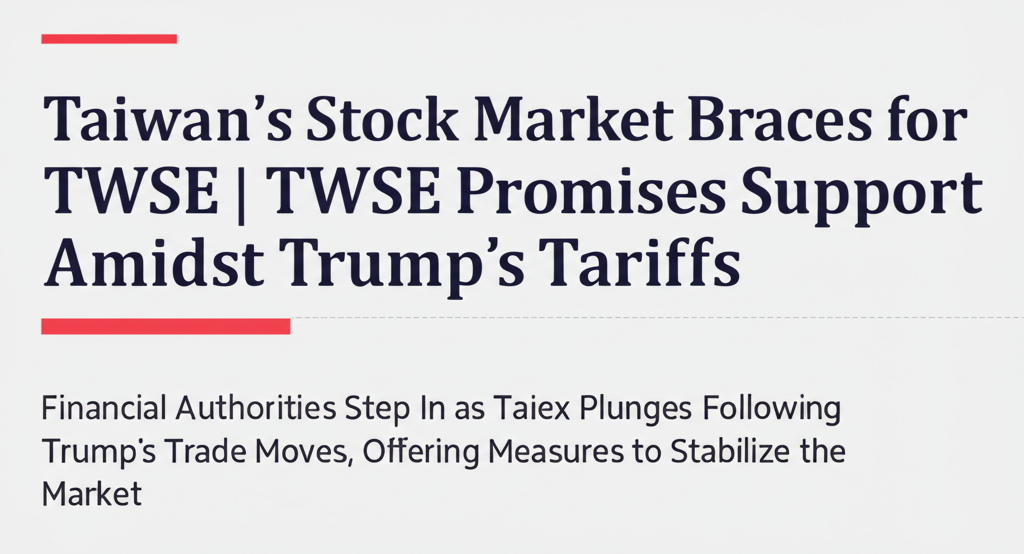Taiwan's Stock Market Braces for Impact: TWSE Promises Support Amidst Trump's Tariffs
Financial Authorities Step In as Taiex Plunges Following Trump's Trade Moves, Offering Measures to Stabilize the Market.

Taipei, April 7 - The Taiwan Stock Exchange (TWSE) announced on Monday its commitment to implement timely measures to support the market and navigate the volatility caused by the tariffs imposed by U.S. President Donald Trump on various countries.
During a press conference held before the market opened, TWSE Chairman Sherman Lin (林修銘) acknowledged Taiwan's unavoidable exposure to global market fluctuations.
Lin stated that the TWSE would closely monitor market dynamics and devise appropriate market support measures, ensuring preparedness to stabilize market conditions.
On Monday, after the four-day Tomb Sweeping holiday, Taiwan's stock market saw a sharp decline, opening with a plunge of over 2,000 points and soon falling below the 20,000 mark.
Investors were keenly observing whether Taiwan's financial authorities would announce a ban on short selling or adjust the current daily maximum decline of 10 percent to mitigate the impact of Trump's new tariffs.
Taiwan's Financial Supervisory Commission (FSC) introduced temporary measures on Sunday to curb short selling, effective Monday through Friday, to address potential sell-offs.
The FSC's measures include reducing the limit of intraday sell orders for borrowed securities, from 30 percent of the average trading volume of the stock over the previous 30 trading sessions, to 3 percent.
In addition, the FSC announced an increase in the minimum short-selling margin ratio on the market from 90 percent to 130 percent.
Market analysts suggest that these short-selling measures primarily aim to prevent foreign institutional investors from selling off local shares, a trend observed in recent trading sessions.
Lin indicated that the FSC's measures would help cushion market volatility and that they would be reviewed during the week to provide effective support to the market.
He further noted that the local capital market has proven resilient in previous global financial crises and is prepared to handle the current situation with effective policies.
The Taiwanese government is committed to supporting local industries while also seeking negotiations with Washington to potentially lower tariffs, according to Lin.
As of 11:57 a.m. Monday, the Taiex, the benchmark index on the main board, had fallen by 2,066.11 points, or 9.70 percent, to 19,232.11. Taiwan Semiconductor Manufacturing Co. (TSMC), a major contract chipmaker and the most heavily weighted stock, experienced a 10 percent drop to NT$848.00 (US$25.54).
Markets in Taiwan and other parts of Asia reacted negatively to Trump's new tariff policy, which was unveiled on April 3, imposing a 10 percent baseline tax on imports from all countries, effective April 5.
Starting April 9, countries with significant trade surpluses with the U.S. would face higher tariffs, including Taiwan (32 percent), China (34 percent), Japan (24 percent), South Korea (26 percent), Vietnam (46 percent), and Thailand (37 percent), as per the new policy.
Other Versions
La Bolsa de Taiwán se prepara para el impacto: TWSE promete apoyo en medio de los aranceles de Trump
Le marché boursier de Taïwan se prépare à l'impact : TWSE promet de soutenir les tarifs douaniers de Trump
Pasar Saham Taiwan Bersiap Menghadapi Dampak: TWSE Menjanjikan Dukungan di Tengah Tarif Trump
Il mercato azionario di Taiwan si prepara all'impatto: La TWSE promette sostegno in mezzo ai dazi di Trump
台湾株式市場、影響に備える:台湾証券取引所、トランプ大統領の関税撤廃の中で支援を約束
대만 주식 시장은 충격에 대비합니다: 트럼프 관세 속에서도 지원을 약속하는 TWSE
Naghanda ang Pamilihan ng Sahod ng Taiwan sa Epekto: Nangangako ang TWSE ng Suporta sa Gitna ng Taripa ni Trump
Фондовый рынок Тайваня готовится к удару: TWSE обещает поддержку на фоне тарифов Трампа
ตลาดหุ้นไต้หวันเตรียมรับมือ: TWSE สัญญาว่าจะให้การสนับสนุน ท่ามกลางมาตรการกีดกันทางการค้าข�
Thị trường chứng khoán Đài Loan chuẩn bị ứng phó: TWSE cam kết hỗ trợ trước thuế quan của Trump
